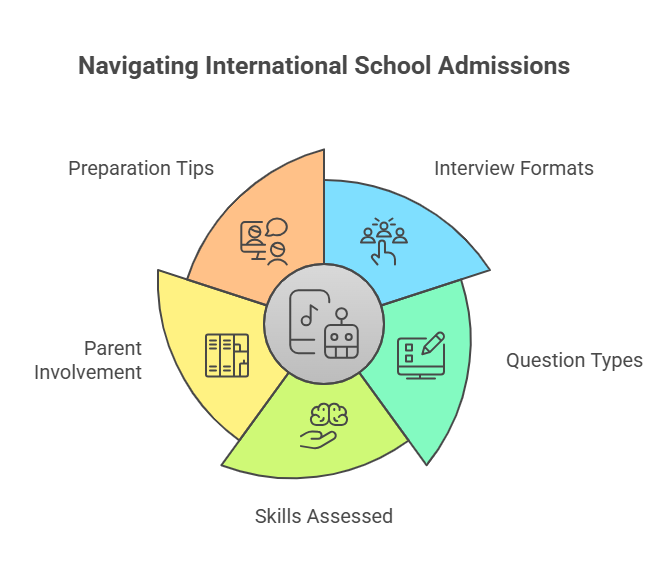Preparing for international school admission interview questions can be a pivotal step in securing your child’s place at a top-tier institution that values academic curiosity and global awareness. Admissions to international schools remain highly competitive in 2026, with increasing emphasis on holistic assessments that go beyond just academic performance.
Whether the interview is on campus or virtual, the goal is to assess whether the child is ready for the school’s academic environment, can demonstrate growth, and shows genuine interest in the school’s values. Many international schools especially for Grades 1–8 are also include a parent interview to ensure family alignment with the school’s educational philosophy.
A 2024 survey by the Council of International Schools noted a 15% increase in virtual interviews. Let’s dive into the top questions interviewers ask, and how to ace them. IB/Cambridge interview alignment focuses on critical thinking, global awareness, and inquiry-based responses that reflect the school’s educational philosophy.
International School Admission Interview Questions & Preparation Guide
What should I expect in the international school admission interview 2026? Schools may include virtual formats, scenario-based questions, and parent sessions. Admissions interviews often include scenario-based questions. Pro tip: Practice virtual interview strategies like testing tech setups beforehand.
Most international schools conduct structured interviews aligned with their curriculum (IB, Cambridge, national boards), often evaluating a student’s communication skills, adaptability, interests, problem-solving, and sometimes even emotional maturity. For parents, schools assess alignment with educational philosophy and willingness to participate in the school ecosystem.
In 2026, expect a mix of in-person and online interview formats, especially for overseas applicants or families relocating. Some interviews may include short written or verbal assessments, too.

Sample International School Admission Interview Questions by Grade
Common questions in international school admission interviews often focus on a child’s personality, academic strengths, and adaptability to new environments. Some of the most frequently asked questions during admission interviews, we’ve listed common questions below by grade level to help students and parents prepare. Virtual interview strategies include testing your tech setup, maintaining eye contact with the camera, and minimising background distractions to ensure smooth communication.
Interview Questions for Grade 1 to 3 Admission
What younger children say reveals their comfort, curiosity, and readiness. These sample questions for Grades 1–3 reflect what interviewers typically use to assess basic communication, self-expression, and early social skills.
- Q: Can you tell me your name and how old you are?
A: My name is Aanya, and I’m 6 years old. - Q: What is your favorite storybook or cartoon, and why?
A: I like Peppa Pig because it’s funny and I like animals. - Q: Can you count from 1 to 20 for me?
A: 1, 2, 3… (continues to 20 confidently) - Q: What do you like to do after school?
A: I like to draw pictures and play with my little brother. - Q: Can you draw or describe your family to me?
A: I have a mummy, a daddy, and a baby sister. We all live in the same house and we go to the park on weekends. - Q: Do you enjoy going to school? What do you like most about it?
A: Yes! I love story time and playing with my friends during recess. - Q: Can you name some colors, animals, or shapes?
A: Red, blue, green. Cat, elephant, rabbit. Circle, square, triangle! - Q: Have you made any friends at your current school?
A: Yes, my best friend’s name is Aarav. We play catch together. - Q: What do you do when someone is being unkind to you?
A: I tell the teacher and try to stay kind myself. - Q: Do you help your parents at home? How?
A: I help clean up my toys and set the table for dinner.
Grades 4–5 (Upper Primary)
At this stage, children are expected to demonstrate more structured thinking, self-reflection, and growing independence. Interviewers assess how students approach learning and interact with others.
- Q: What subjects do you enjoy the most in school, and why?
A: I love science because I enjoy doing experiments and learning how things work. - Q: How do you prepare for a test or an exam?
A: I revise by reading my notes, asking my parents to quiz me, and making flashcards. - Q: What was a challenge you faced in school, and how did you handle it?
A: I found division hard at first, but I practiced a lot and asked my teacher for help. - Q: Can you describe a book or story you’ve read recently?
A: I read Charlotte’s Web. It’s about a spider who helps save her pig friend. I liked how kind Charlotte was. - Q: How do you spend your weekends or free time?
A: I like to play cricket, draw comics, and read mystery books. - Q: What do you do if you don’t understand something in class?
A: I raise my hand and ask the teacher to explain it again. - Q: What does being a good friend mean to you?
A: It means listening, sharing, and being there when someone needs help. - Q: Have you participated in any extracurricular activities or competitions?
A: Yes, I was in the spelling bee and also played piano in music class. - Q: How do you stay organised with your schoolwork?
A: I use a planner to write my homework and pack my bag every night. - Q: Why do you want to join this international school?
A: I want to learn with students from different countries and try new subjects like French.
Grades 6–8 (Middle School)
Students in this group are asked deeper questions to evaluate critical thinking, emotional maturity, and collaborative skills. Schools also start looking for academic drive and global-mindedness.
- Q: Can you talk about a project or subject you’re particularly proud of?
A: I created a science project on renewable energy where I built a simple windmill model. It worked really well! - Q: How do you handle peer pressure or disagreements with classmates?
A: I try to stay calm, explain my point kindly, and if needed, ask a teacher to help. - Q: What are your academic goals for this year?
A: I want to improve in math and get better at public speaking. - Q: How would you describe your ideal school environment?
A: A place where students feel safe, respected, and excited to learn. - Q: How do you balance schoolwork with hobbies or sports?
A: I make a weekly schedule that includes time for homework, reading, and football practice. - Q: Can you describe a time when you worked in a team? What was your role?
A: In a group history project, I was the team leader and helped assign tasks and keep us on track. - Q: What kind of learner do you think you are—visual, verbal, hands-on?
A: I’m a visual learner. I understand better when I see charts or diagrams. - Q: What interests you about studying at an international school?
A: I like the idea of meeting people from around the world and learning more interactively. - Q: Have you ever helped someone in class or your community?
A: I helped a new student adjust to school by showing him around and introducing him to others. - Q: What global issue or topic are you curious about?
A: I’m really interested in climate change and how we can reduce pollution in cities.
Grades 9–12 (High School)
High school admission interviews focus on academic motivation, university aspirations, leadership, and global citizenship. Answers should show maturity, clarity, and purpose.
- Q: What are your future academic or career goals, and how are you preparing for them?
A: I want to study computer science and become a software engineer. I’m taking coding classes and participating in tech clubs. - Q: Why have you chosen to apply to an international school for high school?
A: I want a global education that prepares me for university abroad and helps me learn critical thinking skills. - Q: How do you manage your time and prioritise tasks?
A: I use a digital planner to set deadlines and allocate study time, while still keeping space for hobbies. - Q: Can you describe a leadership experience you’ve had?
A: I was the class monitor and organised a school recycling campaign with my classmates. - Q: What is your approach to problem-solving in group work or discussions?
A: I listen to everyone’s ideas, help find common ground, and try to keep the group focused on the goal. - Q: How do you handle academic pressure or stress?
A: I break big tasks into smaller parts, take breaks when needed, and talk to someone if I feel overwhelmed. - Q: What subject or field are you most passionate about, and why?
A: I’m passionate about biology because I’m fascinated by how the human body works and want to go into medicine. - Q: How do you stay informed about world events or global issues?
A: I read international news websites, follow educational YouTube channels, and sometimes watch documentaries. - Q: What does being an international-minded student mean to you?
A: It means respecting different cultures, being open to global ideas, and thinking beyond borders. - Q: How do you contribute positively to a school community?
A: I volunteer, help classmates when they struggle, and take part in clubs and school events with enthusiasm.
Parent Interview: Key Questions & Sample Answers
In international schools, the parent interview often carries as much weight as the student interview. It helps assess family engagement, alignment with the school’s culture, and the support system behind the student.
1. Why have you chosen this school for your child?
Sample Answer: We appreciate the school’s emphasis on holistic education and international curriculum. We want our child to grow in a nurturing, globally-aware environment.
2. How do you support your child’s learning at home?
Sample Answer: We maintain a structured homework schedule, encourage independent reading, and ensure open conversations about what they learn every day.
3. Are you prepared to participate in the school community?”
Sample Answer: Yes, we strongly believe in community involvement and are happy to contribute to school events or volunteering efforts.
4. “What are your child’s strengths and areas for growth?
Sample Answer: Our child is naturally curious and loves exploring new ideas, especially in science and art. We’re working on helping them become more patient when facing challenges and encouraging resilience.
5. How does your child respond to structure and discipline?
Sample Answer: Our child adapts well to routines and understands the importance of boundaries. We use positive reinforcement and gentle correction to guide their behaviour and decision-making.
6. What are your educational goals for your child?
Sample Answer: We want our child to develop into a confident, compassionate individual with strong critical thinking skills. A well-rounded education that includes academics, arts, and global awareness is important to us.
7. How do you handle conflict or challenges involving your child at school?”
Sample Answer: We believe in open, respectful communication. If any issue arises, we prefer to approach it calmly and collaboratively, working with teachers to find the best solution for our child’s well-being.
8. What role does culture or language play in your family’s life?
Sample Answer: We speak both English and our native language at home and value cultural diversity. We encourage our child to appreciate different traditions and perspectives, which is why an international school appeals to us.
9. What are your expectations from the school as a partner in your child’s education?
Sample Answer: We value clear communication, academic guidance, and emotional support. We hope to work closely with teachers to nurture our child’s unique talents and ensure their holistic development.
How to Prepare for an International School Admission Interview
Knowing how to prepare for an international school admission interview can greatly boost your child’s confidence and readiness on the big day. Preparation involves more than practising answers, and it includes understanding the school values, encouraging your child to express themselves clearly, and helping them feel comfortable in a formal setting.
Parents should also be prepared, as many schools involve them in the interview process to assess the family’s commitment and values. Parents and children who prepare effectively present themselves authentically and make a lasting, positive impression. Many international students choose to Study in Canada for its high-quality education, diverse culture, and globally recognised degrees.
Understand the School’s Philosophy
Research the school’s curriculum (e.g., IB, Cambridge), values, extracurricular strengths, and community focus. Tailor your responses to reflect how your child and family fit this environment.
- Is it IB (International Baccalaureate) or Cambridge International?
- What languages are offered?
- Does the school emphasise STEM, humanities, or the arts?
Use the STAR Method (Grades 6–12)
Teach older students to answer with the Situation, Task, Action, and Result format for structured, meaningful responses.
Presentation Tips for Interview Day
- Dress neatly but comfortably
- Maintain eye contact and smile
- Encourage kids to speak naturally, not robotically
- Minimize distractions during virtual interviews
Conduct Mock Interview Questions for International School Admission
Use scenario-based and age-appropriate mock interview questions. Practice virtually (Zoom, Google Meet) to simulate online formats.
Grades 1–5
- Introduce yourself
- What’s your favorite book or toy?
- What do you want to be when you grow up?
- Can you describe your family?
Grades 6–8
- Describe a group project
- Talk about a disagreement you handled
- What are your hobbies or school clubs?
Grades 9–12
- What are your future goals?
- Which university subjects interest you and why?
- What does global citizenship mean to you?
Develop the Best Answers for International School Interview Questions
Practising answers helps students develop confidence and articulate their thoughts effectively. It encourages them to reflect on their strengths, interests, and values, allowing them to present themselves authentically. This preparation demonstrates their potential fit within the school community while fostering valuable self-awareness. Students can impress interviewers and demonstrate their excellent fit to the school environment by carefully preparing with the right attitude. This process also promotes self-awareness, a valuable skill for their development.
Use the STAR method for older children (Grades 6+):
- Situation: What happened?
- Task: What was the goal?
- Action: What did you do?
- Result: What was the outcome?
This helps structure thoughtful, outcome-focused answers. The requirements for OSSD include earning 30 credits, completing 40 hours of community service, and passing the Ontario Secondary School Literacy Test.
Interview Day: What to Expect and How to Present Yourself
Some of the most insightful questions asked in international school interviews for parents aim to understand family values and home learning support.
Here’s what students and parents should keep in mind:
- Dress Code: Wear clean, modest, and age-appropriate formal or semi-formal clothing.
- Body Language: Maintain eye contact, sit upright, and smile.
- Confidence Cues: Speak clearly, nod occasionally, and avoid fidgeting.
For young children:
- Avoid over-rehearsing young children to preserve authenticity.
- Let their natural curiosity shine.
- Bring a familiar object to comfort them if allowed.
If your child is nervous:
Reassure them that it’s okay to pause, ask for clarification, or say, “I’m not sure, but I’d love to learn more.”
Parent Q&A Script
- Share a strength and a weakness of your child.
- What is your biggest expectation from the school?
- How do you resolve academic or behavioural issues at home?
Conclusion
International school entry interviews in 2026 require preparation, clarity, and a calm mind. These interviews assess academic readiness, personality fit, and family values. But also getting to know the personality of the child, his values and how the family fits into the school philosophy. There should be honesty, optimism and openness in the process taken by the parent and student. The interview can be taken as an event that will allow showcasing the exceptional qualities of the child, as well as prove an actual desire to join the rich life of the school. Ready to practice? Join USCA ACADEMY for free 2026 Interview Prep Checklist for tailored role-play scripts.
Frequently Asked Questions About International School Admission Interview Questions
1. How strict are international school admission interviews?
They are structured but not intimidating. International schools aim to understand the student’s personality, academic readiness, and ability to adapt to a global environment. Interviewers typically create a friendly atmosphere to help the child feel comfortable. The goal is to evaluate whether the student aligns with the school’s values and learning style, not to disqualify them for minor flaws. A thoughtful conversation, good manners, and sincere interest in learning often count more than “perfect” answers.
2. What if my child struggles with English?
Schools often consider potential rather than just current fluency. If your child demonstrates curiosity, a willingness to learn, and basic communication skills, mild language difficulties won’t be a barrier. Many international schools provide English as a Second Language (ESL) or English Language Learning (ELL) support to help non-native speakers. During the interview, encourage your child to express themselves honestly and even simple, clear sentences show effort. A positive attitude toward improving is usually seen as a strong asset.
3. Do online interviews differ from in-person ones?
Yes, there are key differences in setup and delivery. In online interviews, a calm, distraction-free environment is essential. Ensure proper lighting, good sound quality, and a stable internet connection. Test all equipment beforehand and do a mock session. Since body language is harder to interpret online, speaking clearly and maintaining eye contact with the camera becomes more important. Smiling, being relaxed, and showing enthusiasm go a long way in making a good impression virtually.
4. What are the best strategies for succeeding in the admission interview?
Start preparation early to build your child’s confidence and comfort with speaking about themselves. Learn about the school’s values, curriculum, and extracurricular offerings. Practising with mock interviews helps children articulate their thoughts better. Teach them to give thoughtful, honest, and reflective answers. Encourage them to share their interests, hobbies, and what excites them about learning. A calm, curious, and enthusiastic attitude often stands out more than rehearsed responses. Let their personality shine through naturally.









